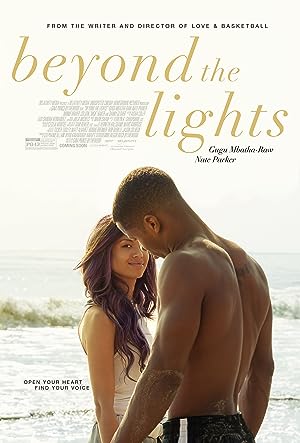Beyond the Lights is about Noni, a biracial black singer who is on the threshold of breaking through showbiz when she has a crisis of the soul. A friendly black cop who is not star struck, but definitely attracted, intervenes in a timely fashion, and they end up becoming romantically involved, which complicates their career ambitions, but gives her the courage she needs to reclaim her body, her soul, her identity and her career from those who tried to shape her or exploit her.
I was either online reading an article or browsing through Netflix and saw a photo of Minnie Driver standing next to a black woman with purple hair, immediately intuited that they were supposed to be mother and daughter then added Beyond the Lights to my queue. Imagine my disappointment when I finally watched and realized that rapey Nate Parker was in it. Ugh! I still watched anyway because nothing gets in the way of me watching a film about interracial parents. Media representations of interracial parent relationships are hard to find in the media, and I was going to try and not let that guy ruin it for me.
Timing is everything, and I wish that I had seen Beyond the Lights before Birth of a Nation was a glimmer in rapey Nate Parker’s eye. It was not his acting, but I kept eyeing him with suspicion during all of Noni’s romantic scenes, which was obviously not the filmmaker’s original intention. Beyond the Lights actually does an amazing job of highlighting the problematic sexual nature of singing as taken for granted, but ultimately damaging in erasing boundaries, particularly for young women.
I was most fascinated by two story elements in Beyond the Lights. First, Beyond the Lights does a great job in making Noni more than a trope, but a complete human being from a child to an adult. She was always going to be a singer, and she was always moving in a certain direction as a singer (more Nina Simone than our current musical climate with all due respect to the amazing talent behind this commercial landscape), but Beyond the Lights really emphasizes how soul killing the process of fame is, and there is never a moment when I did not take it seriously. Before watching Beyond the Lights, I did not know that a black woman made the film, but the scenes dealing with hair were a dead giveaway.
Second, I do wish that Beyond the Lights spent more time on Noni’s relationship with her mother instead of Noni needing a man to find herself because that relationship brought up the most powerful elements of the film. Beyond the Lights tiptoed a bit too close to the tragic mulatto trope for my taste, but because her existential crisis was more about exploitation and not racial identity, I think that this was inadvertent and will sign a waiver. Driver brings a necessary and recognizable fierceness to the role of single mother and stage mom turned cutthroat businesswoman that makes Beyond the Lights believable. She loves her daughter, but also has something to prove and never left survival mode thus her desire to turn a blind eye to her daughter’s pain. Beyond the Lights briefly depicts poverty, racial and sexist societal stigma as powerful motivators to disregarding and dismissing mental health issues. If you are doing well, then you should be fine, right? No. I did not see Fish Tank until long after seeing Beyond the Lights, but I imagined that Driver could have been from the same neighborhood and could truly not imagine the pain that her daughter was going through. Driver paints a whole world and history unseen on the screen in her supporting role in Beyond the Lights.
I did not realize at the time that Gugu Mbatha-Raw, who starred in Belle, which I loved, played Noni. She can sing! I need people to cast her in more roles because she is great and unrecognizable. I did not know that she was the wife in Concussion (2015)!
Beyond the Lights is a strong film if you can look past rapey Nate Parker as the co-star.
Stay In The Know
Join my mailing list to get updates about recent reviews, upcoming speaking engagements, and film news.





